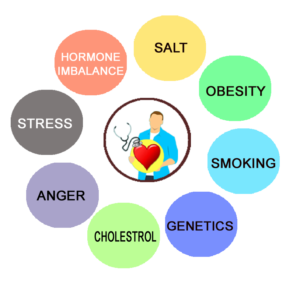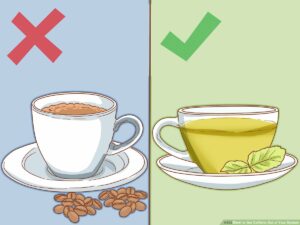Contents
Causes And Risk Factors Of Hypertension
Hypertension develops over years. The exact reason for high blood pressure is not known yet but there are certain factors that may play a role in the development of hypertension. These risk factors or causes of hypertension could be-

- Smoking
- Obesity
- Too much salt in the diet
- Too much alcohol consumption
- Stress
- Too little potassium in your diet
- Older age
- Genetics
- Hormonal imbalance
- Family history of blood pressure
- Certain chronic disease
Race
African-Americans are at a greater risk of developing hypertension than people of other races. African- Americans develop high blood pressure earlier in their life and have more difficulty achieving blood pressure goals. Some studies suggest that African- Americans may be more sensitive than other races. These small amounts of half-teaspoon of salt can help raise blood pressure by 5 mm Hg. dietary factors and being overweight can also raise blood pressure.
Too Much Sodium In Your Diet

Sodium is a chemical found in salt, plays a role in increasing blood pressure by promoting the retention of fluid by the body. This increases the pressure on the heart to work more. Some studies recommend an upper daily limit for sodium consumption of 1500 mg. Checking the sodium amount on food labels and menus can help you keep a track of how much sodium you are consuming. Launch meats and canned soups have particularly high levels of dietary sodium. Processed foods are high in sodium and makeup about 75% of our sodium intake.
Stress

Stress leads to temporary elevations of blood pressure, however, there is not enough evidence that proves stress as a cause of ongoing high blood pressure. Being stressed may have an indirect effect on blood pressure since it can influence other risk factors for heart disease. Sometimes people who are stressed about something tend to adopt unhealthy habits like poor nutrition, alcohol use, and smoking. All of these habits are risk factors for high blood pressure and heart disease.
Weight

Being overweight or obese also increases the risk of getting hypertension and increases the workload required by your heart. Many diet plans that are designed to control blood pressure are often designed to reduce calories as well. Most of these diets require decreased consumption of fatty foods and sugars while increasing your intake of lean protein, fiber, by adding fruits, and vegetables in your diet. But the good thing is that losing even fewer pounds can make a significant difference in your blood pressure. If you lose just 10 pounds, it can help in improving blood pressure majorly.
Alcohol
Too much alcohol consumption is a risk factor for high blood pressure. Some researchers and health care professionals recommend not more than two drinks for men and one drink for women in a day. Adults who drink more than three drinks in one sitting increase their blood pressure temporarily. However, drinking too often can lead to long-term increased blood pressure causing hypertension. People who drink a lot and do not eat enough are more at risk of developing hypertension.
Caffeine

Caffeine can bring on jitters but there is no evidence that it can cause long-term hypertension. But a caffeinated beverage might cause a temporary rise in blood pressure. It is possible that caffeine could block a hormone that helps keep arteries widened, it causes blood pressure to rise. Another way coffee affects your blood pressure is by stimulating adrenal glands to secrete more adrenaline, causing blood pressure to increase.
Medication

Certain medications contain compounds that can increase your blood pressure. Cold and flu medications that contain decongestants are one example of drugs that raise blood pressure. Some other kinds of medicines that can raise blood pressure are steroids, diet pills, non-steroidal and inflammatory drugs. Some over-the-counter pain relief medicines and antidepressants are also harmful to blood pressure. Before taking any medication that might affect your blood pressure, talk to your doctor.
Too Little Potassium In Your Diet
Potassium helps balance the amount of sodium in your body’s cells. A proper balance of potassium is critical for good health. A proper balance of potassium is critical for good health. Make sure you intake enough potassium to balance sodium.
Age
The Elderly are more at risk of developing hypertension than young adults. The risk of high blood pressure increases with increasing age. By the age of 64, high blood pressure is more common in men. Women are more likely to develop hypertension after the age of 65.
Genetics
The condition of high blood pressure tends to run in families. So, if your parents or siblings have hypertension, you are likely to acquire it as well.
Certain Chronic Health Conditions
Certain health conditions increase the risk of high blood pressure. These conditions could be diabetes, kidney disease, thyroid, and sleep apnea. These diseases affect the blood pressure in your body. Some congenital defects in blood vessels are also a cause of increased blood pressure.
Who Is At Risk Of Developing Hypertension?
On the basis of the causes and risk factors mentioned above, if one needs to determine who is more at risk of developing hypertension. Then it could be-
- A person who has a family member with high blood pressure condition
- African American person
- A person of age above 55.
- Someone who is overweight or has an inactive lifestyle
- A person who eats foods high in sodium or salt
- A smoker
- Someone who consumes excessive alcohol.
- If the person has diabetes, thyroid, or certain health conditions.
If you have any of these habits or factors, try to eradicate them from your life. In case you are already overweight, lose some pounds, if you lead a stressful life, have some fun. Blood pressure is a disease that can be controlled if diagnosed and treated at the right. Therefore, keep a track of your blood pressure and live a healthy life.
A Word From Mantra Care
If you are looking for an affordable hypertension treatment MantraCare can help- Book a trial hypertension care session



